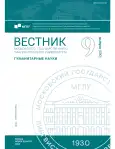VERBAL AGGRESSION IN THE DISCOURSE OF DRAMA FROM THE STANDPOINT OF LINGUISTIC PRAGMATICS
- Авторлар: Loginova E.G.1
-
Мекемелер:
- Ryazan State University named for S. Yesenin
- Шығарылым: № 9(890) (2024)
- Беттер: 73-79
- Бөлім: Linguistics
- URL: https://journal-vniispk.ru/2542-2197/article/view/297455
- ID: 297455
Дәйексөз келтіру
Аннотация
The article presents the results of the study of verbal aggression in the discourse of drama. The aim was to identify the linguistic means that mark verbal aggression whether directly or indirectly and to specify the cognitive mechanisms. Having analyzed two plays (Chekhov's “Uncle Vanya” and Sadur's “Ekhaj”) the author summarizes the linguistic markers of verbal aggression paying special attention to autoagression as well as gradation of verbal and non-verbal means used to realize this “anti-polite” speech strategy.
Негізгі сөздер
Авторлар туралы
Elena Loginova
Ryazan State University named for S. Yesenin
Хат алмасуға жауапты Автор.
Email: e.loginova-rsu@mail.ru
PhD (Philology), Associate Professor, Professor of the Department of the English Language and Language Teaching Methodology Foreign Languages Institute, Ryazan State University named for S. Yesenin
РесейӘдебиет тізімі
- Sheigal, E. I. (2000). Semiotika politicheskogo diskursa = Semiotics of political discourse. Moscow, Volgograd: Peremena. (In Russ.)
- Radchenko, O. A. (2009). Issledovanie agressivnogo diskursa: problemy i perspektivy = The analysis of aggressive discourse: problems and perspectives. MCU Journal of Philology. Theory of Linguistics. Linguistic Education, 1(3), 60–66. (In Russ.)
- Komalova, L. R. (2020). Aggressogen discourse: the multilingual aggression verbalization typology. Moscow: Sputnik. (In Russ.)
- Liu, Qiqi. (2023). Emoji as a manifestation means of verbal aggression in Russian and Chinese internet communication. Vestnik of Moscow State Linguistic University. Humanities, 2(870), 66–70. (In Russ.)
- Arnol’d, I. V. (1975). Interpretaciya hudozhestvennogo teksta: tipy vydvizheniya i problema ekspressivnosti = Interpretation of a literary text: types of extension and the problem of expressiveness. Ehkspressivnye sredstva anglijskogo yazyka (pp. 11–20): collection of papers. Leningrad: LGPI. (In Russ.)
- Teliya, V. N. (1991). Ekspressivnost’ kak proyavlenie sub”ektivnogo faktora v yazyke i ee pragmaticheskaya orientaciya = Expressiveness as a manifestation of subjectivity in language and its pragmatic orientation. The human factor in language. Linguistic mechanisms of expressiveness (pp. 14–56). Moscow: Nauka. (In Russ.)
- Loginova, E. G. (2021). Semioticheskij rezonans v hudozhestvennoj kommunikacii i hudozhestvennom diskurse = Semiotic resonance in natural communication and in artistic discourse. Ryazan: Ryazan State University named after S. A. Yesenin. (In Russ.)
- Halizev, V. E. (1986). Drama kak rod literatury (рoetika, genezis, funkcionirovanie) = Drama as a kind of literature (poetics, genesis, functioning). Moscow: Izdatel'stvo MSU. (In Russ.)
- Herman, V. (1995). Dramatic Discourse: Dialogue as interaction in plays. London–New York: Routledge.
- Zingerman, B. I. (1979). Ocherki istorii dramy 20 veka: Chekhov, Strindberg, Ibsen, Meterlink, Pirandello, Brekht, Gauptman, Lorka, Anuj = Essays on the history of the 20 th century drama: Chekhov, Strindberg, Ibsen, Maeterlinck, Pirandello, Brecht, Hauptmann, Lorca, Anuy. Ed. by A. A. Anikst. Moscow: Nauka. (In Russ.)
- Zhel’vis, V. I. (1990). Emotivnyj aspekt rechi : Psiholingv. interpretaciya rechevogo vozdejstviya : ucheb. Posobie = The emotive aspect of speech : Psycholinguistic. interpretation of speech effects. Yaroslavl’: YarSU. (In Russ.)
- Losev, A. F. (1982). Znak. Simvol. Mif = Sign. Symbol. Myth. Moscow: Moscow State University. (In Russ.)
- Zabotkina, V. I. (2007). Semioticheskie aspekty predstavlenija znanij v semanticheskoj strukture slova = Semiotic aspects of knowledge representation in the semantic structure of the word. Problems of representation in language (pp. 48–55). Types and formats of knowledge. Moscow, Kaluga: Ejdos. (In Russ.)
- Yanko, T. E. (2008). Intonacionnye strategii russkoj rechi v sopostavitel’nom aspekte = Intonation strategies of Russian speech in a comparative aspect. Moscow: Yazyki slavyanskoi kul’tury. (In Russ.)
- Talmy, L. (2007). Attention Phenomenon. In Geeraerts, D., Guyckens, H. (Eds.), The Oxford Handbook of Cognitive Linguistics (pp. 264–293). Oxford: Oxford University Press.
Қосымша файлдар










